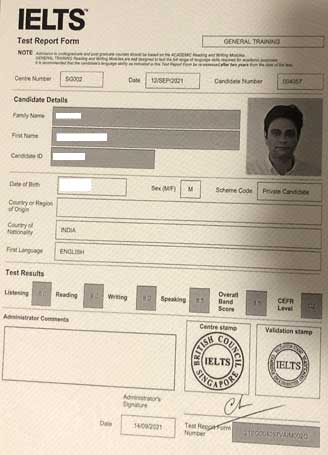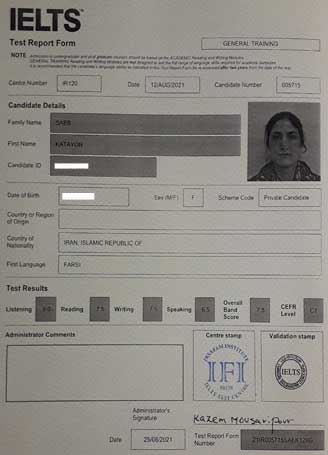As with anything in life, in IELTS preparation there is theoretical knowledge, and then there is practical knowledge. Theoretical knowledge includes all the methods that should work, whereas practical knowledge is something that you’ve done and it actually produced the results you were hoping for.
The two people you are about to meet won in our IELTS results competition and got Band 7.5 and Band 8.5. Today they are sharing their priceless practical knowledge – so give them 5 minutes of your undivided attention. It’s worth your time.
First we have M.V. from India – he got Band 8.5 in IELTS. M.V. asked us to keep his full name confidential, but his IELTS certificate proves his identity and score, so yes – you can trust what he says.
“This is really awesome to receive a winner’s certificate from your side.
I have all the thanks to be given to you and the team. Below are my tips to share with other aspirants:
1. Don’t look around for confusing content online – just get ‘Ace the IELTS’ book and the computer based tests – you are all set with enough material.
2. Follow the time table given in the book – it helped add some structure to my study and told me what I need to do. This helps one avoid choosing only things that they like or are good at. If you follow the schedule in the book, you cannot skip writing – which many of us leave for last or avoid.
3. Read the book first and then keep doing the practice tests – it helps a lot.
4. Toward the last 2 weeks before the exam – keep attempting the whole exam in one sitting, so you can learn time management – that’s the most important skill.
5. The first quote in the book is your rally cry – learn to take the IELTS test and don’t focus on learning English. Your English level will not improve in 4-8 weeks time and definitely won’t reach the level of a native speaker.
6. If you can fix a time when you will prepare – I woke up at 5 am for 4 weeks to ensure I prepare at the dedicated time and this builds a rhythm. Hidden agenda: if I can practice when I sleepy, exam my mind will be share and operate at peak 
7. I followed the advice from the IELTS Doctor (part of ‘IELTS Success Formula’ book) – this helped me immensely in writing and ensuring that even with tough/unknown topics, I use good sentence structure and paragraph alignment. That makes a great impression on the examiner.
8. Listen to some youtube channels for listening practice and that should help a lot to construct your speech.”

Next we have the lovely Katayon Saeb from Iran who got Band 7.5 in IELTS. Katayon gives you an honest recount of her IELTS preparation – including things that did not work for her:
“Listening – I listened to different podcasts on a daily basis and used transcripts for the audio. This helped me a lot in understanding different accents. The podcasts I used were ‘6 minutes English’, ‘The English we speak’, ‘News in Levels’, ‘99% invisible’, and ‘Radio Lab’.
Reading – I solved all Cambridge test books, both General Training and Academic, checked my answers, and focused on the type of questions that I had most wrong answers. Then, I tried to find out the correct answer with valid reasons, so I could prevent further mistakes in the future.
Writing – This part of the IELTS exam has been the most challenging one for me for years, and my score never changed from 6.5, though I received 7.5 the last time since I STUDIED the band descriptors really carefully, and tried my best to follow the instructions. I truly recommend everyone who wants to take part in exam to read and understand the band descriptors which are the base of evaluation for examiners.
Speaking – Unfortunately, this time I didn’t receive the score I wanted in Speaking, it was 6.5! However, I understood what my mistakes were and now I work on them. What’s more, I am going to use the new words, collocations, and also grammar of the audio recordings I listen to in my speaking.”

https://ift.tt/3zjkJ74
from IELTS-Blog https://ift.tt/3reZP8f
via
IFTTT



